
5 Ways to Use a Company Information Database
Simone Autiero, 19 October 2023
Accurate, up-to-date information on businesses is not easy to get hold of. You can use free business registers such as Companies House and trawl through listings and PDFs manually, or use the Office for National Statistics (ONS) to view aggregated business data and trends. But while these can be helpful, they won’t give you the depth of information that you need.
For instance, it’s difficult to search for businesses by sector using Companies House data. The system exclusively uses Standard Industrial Classification (SIC) codes to organise companies by sector. These categorisations haven’t been updated since 2003, meaning lots of the high-growth sectors in the UK, such as “fintech” or “artificial intelligence” are missing.
In contrast, one of Beauhurst’s platforms will actually give you what you need from a company information database. Our team of more than 60 data analysts use machine learning to compile data from real-time sources. We clean, standardise, and enrich the data to make it easy to search, compare, and deep-dive into any current or past UK business.
In this post, we’ll outline five ways you can use our UK company information database to access deeper, more structured information than you’d find anywhere else. We’ll tell you about how real-world companies and organisations are benefiting from our platforms.
Beauhurst has four products, tailored to universities, local governments & public sector, investors, financial & professional services, and sales teams. They all have access to our complete business database. Check out the one that’s right for you and book a demo to see how it works.
1. Access the deepest UK business data available anywhere
With Beauhurst, you can access the richest, most accurate, and most in-depth dataset of UK businesses available. Through our platforms, you’ll find information on nearly 13m companies (both active and inactive) that you can search, compare, and drill down into.
We bring together thousands of data points from a vast range of government and third-party sources—including HMRC, censuses, patent registries, the media, and private companies themselves. (We also use Companies House listings, but we’ve updated and enriched the information so you can search the latest sectors, including clean technology, SaaS, and more).
We clean up all this disparate business information and stitch it together, to create complete profiles of real operating companies (not just legal entities, which you’d find on Companies House and most other databases out there). You can then browse and compare these company profiles using filters to find the information that’s most relevant to you, including company holdings, ownership structure, people, transactions and much more.
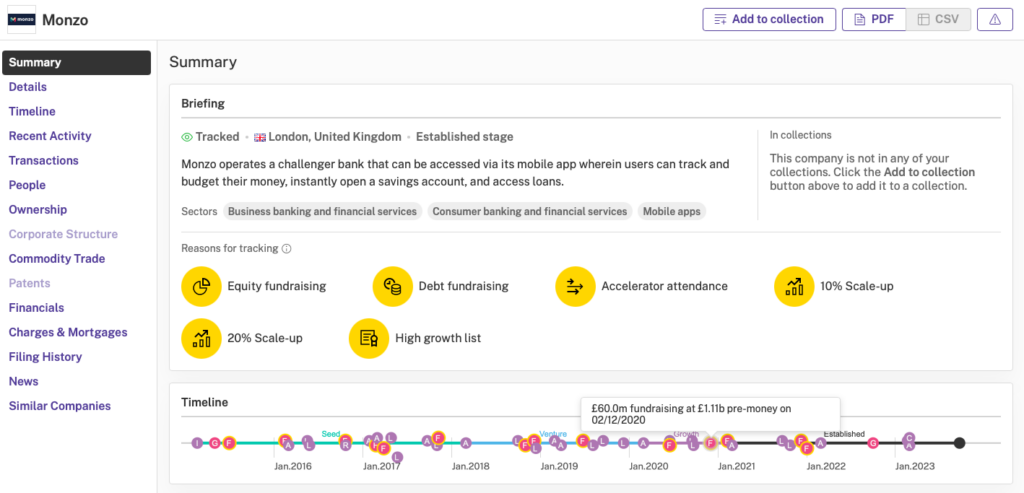
For example, on Beauhurst, you can see:
- Businesses’ key events, such as whether they’ve been spun out of a university, or received recent funding
- Influential people, including owners, directors, and investors—plus, the number and gender balance of the company’s employees
- Their operating headquarters, not just their registered addresses. Often, these are different, giving you a skewed sense of where businesses actually operate. With Beauhurst, you get the true picture of where the company is located.
- Financial data, with annual reports including turnover, total assets, and staff costs
- Patents, including which country they’re registered, in Europe and beyond
- And lots, lots more—you can find out more about our company data here
You can use this data to identify high-growth companies, see which businesses are pioneering in a particular sector, understand what they’re bringing to the local area, and more.
For example, the team at JP Jenkins (the UK’s oldest private share trading venue) use our platform, BeauhurstSales to identify prospects and vet inbound enquiries.
Now, JP Jenkins can easily perform due diligence and understand whether specific companies are a good fit for their platform; “Beauhurst has been really, really important to us,” according to Mason Doick, Head of Corporate. “It’s been vital not only for the valuations, financials and filings metrics, but also to enable us to focus on how we target and review companies that are suitable to build a pipeline of ideal clients.”
2. Easily search for companies that perfectly match your needs
Many company information databases are only useful if you already know the company name you’re looking for. They’re not effective discovery tools. That’s not ideal for lots of organisations—for example, for universities seeking new partnership opportunities with technology startups, local high-growth companies, or institutional spinouts.
This is why each of Beauhurst’s platforms (note: BeauhurstImpact has been created for universities and public sector organisations) comes with an extremely powerful search tool. Rather than having to sift through hundreds of businesses yourself, our platforms let you identify all the businesses that match very specific, overlapping criteria.
So, if you’re a local authority looking to support local tech startups—or an investor looking for growing companies in a particular sector—you can find them in just a few clicks.
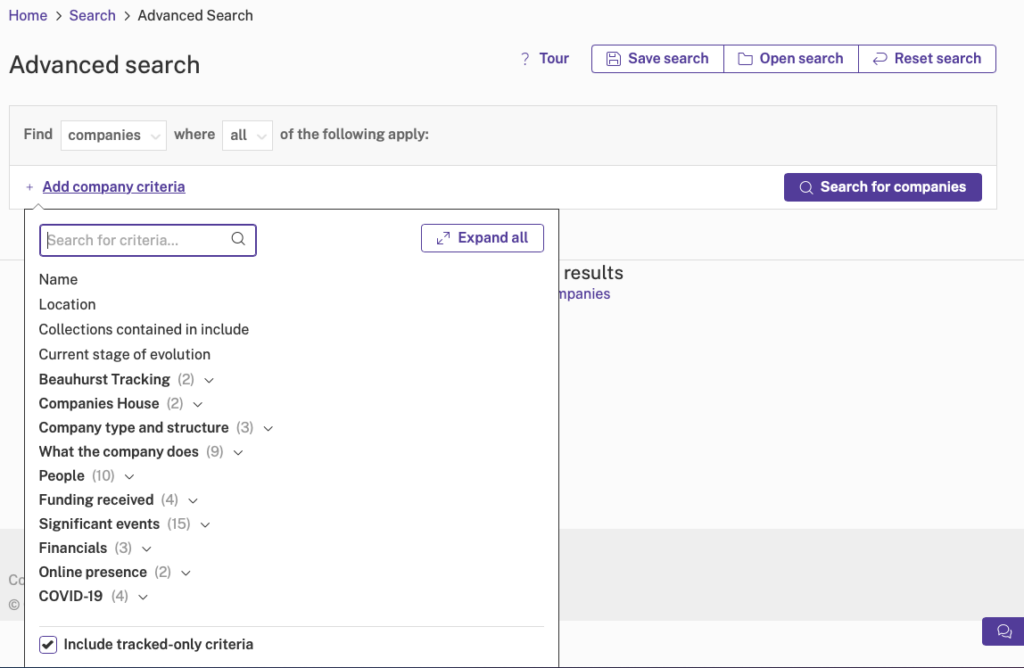
For instance, you can search for companies by multiple overlapping criteria, such as:
- Industry. Using the “What the company does” dropdown, you can search by SIC codes, target markets, commodity trade activity, or by buzzwords. For example, you can search “3D printing” or “foodtech” to find relevant companies in that niche.
- Location, by head office, registered address, or trading addresses—so you know where businesses are actually operating.
- Significant events. For instance, limit your search to university spinouts, companies with patents in particular countries, or businesses with an IPO.
- Stage of evolution. This way, your search will return only startups or companies that are in the process of scaling.
- Financial information. Similarly, you may want to only see companies with a pretax profit above £1m, for instance—or another criteria.
There are many more criteria you can search by, including key people, the impact of COVID-19, or whether they’ve received funding. Plus, you can overlap all of these criteria to narrow down your search—meaning you can get super precise with minimal effort.
For example, if you want to find insurtech (insurance technology) companies in Yorkshire with over 50 employees, that’s really straightforward—without you having to manually search through information. See below:
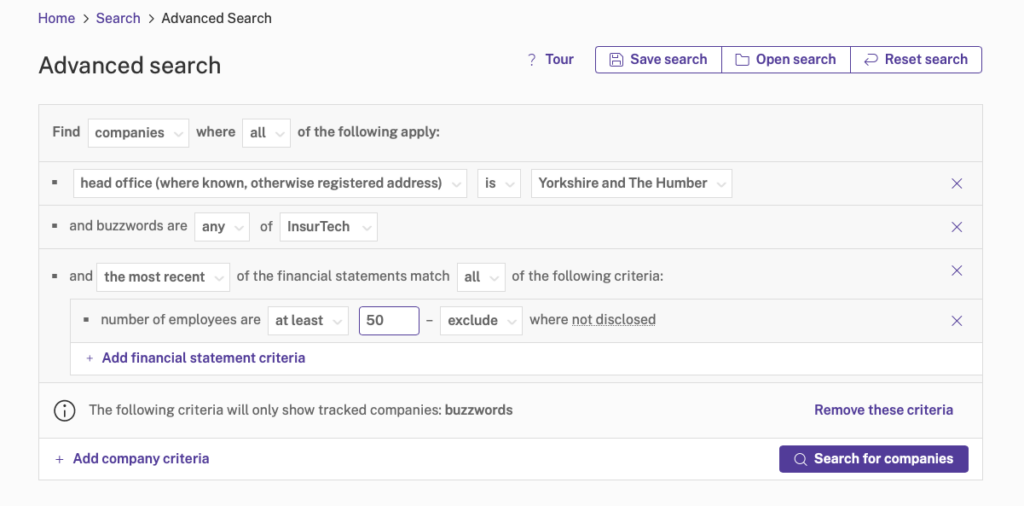
In fact, Lancashire County Council uses BeauhurstImpact to search for and identify local scaleups, by using criteria such as whether they’re raising equity. “With Beauhurst, we have access to real-time information, with a level of detail that we wouldn’t get anywhere else,” says Amin Vepari, Business Finance and Scaleup Lead. “We have much more oversight [over businesses] now, from their corporate structure and timeline of activity, to their employee count, revenue and whether they’ve accessed any grants or funding.”
3. Discover influential individuals to connect with
Alongside the company search, you can also use Beauhurst to find key people in companies, niches, localities, or sectors. Our platforms have profiles of nearly 20m key individuals, including company directors, owners, and shareholders.
Like our business data, we source this information from a huge variety of sources, to create individual profiles on the people that matter in a particular industry, region, or company.
If you know the name of an individual already, you can navigate directly to their profile, where you can see:
- Past and present job roles
- The shares they own
- Whether they’re a key person in a company or fund
- Their contact details, including their social media profiles such as LinkedIn, phone numbers, or email address
- Whether they’re in your network, by first- or second-degree relation

Alternatively, just as with the company search tool, you can search for people by multiple overlapping criteria. For instance, you might be looking for experts in artificial intelligence who are located in London. You could then refine your search so that you see directors or founders of AI companies with a turnover of £20m in that focus area.
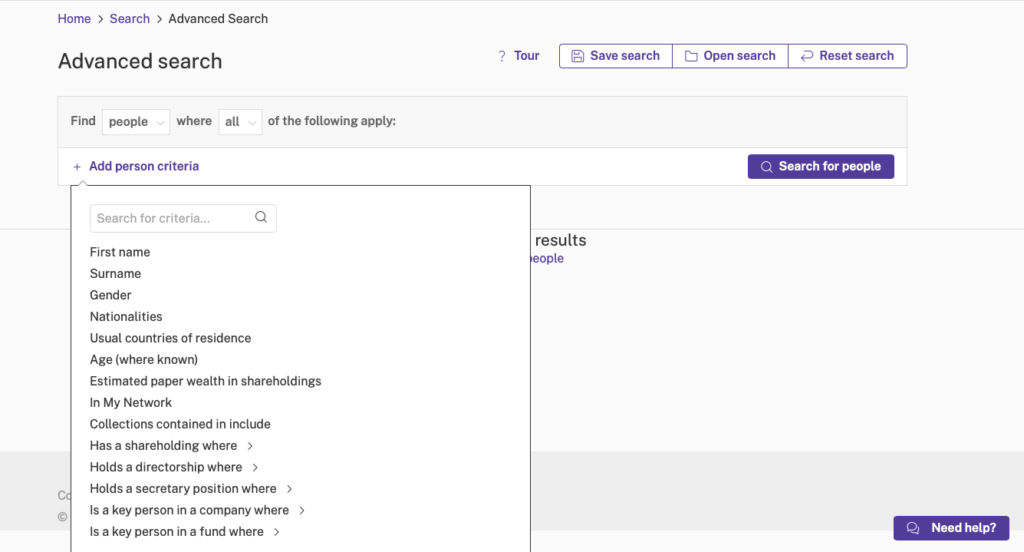
Then you can click through to their profiles to see all the information you need to know. (Note: Beauhurst is not a tool you should be using to just scrape email addresses. If that’s all you’re looking for, we’re not the right platform for you.)
As just one example, the private members’ club, Home Grown, uses Beauhurst to find new potential members and reach out personally to very targeted audiences. With Beauhurst, they’ve been able to identify their ideal customers and approach them in ways that are natural and personalised. This strategy has resulted in more membership signups.
“The last campaign we did was to target high-growth, new business founders that started a business within the last 12 months and were based in London,” says Jessica Barwell, Marketing Communications Manager. “So I put those criteria into the platform and came up with 160 founders. And often, that smaller number is far more valuable than a list of, say, 5,000 people because we can be really specific and tailored with our outreach.”
4. Understand what businesses are doing in your local economy
Beauhurst has the deepest data on UK businesses that’s available anywhere. But our users can do much more than search for companies or individuals. You can also zoom out to get a live picture of the business ecosystem in your locality.
When you use one of Beauhurst’s platforms, you get a view of the state of the local economy for any area of the UK—growth rates, employment data, and aggregated information about different active sectors. This is all regularly updated by our team of data scientists, meaning you get reliable information to assist your decision-making.
Just one example: if you do a search for businesses in Swindon, you’ll be served a granular picture of what’s happening in the Swindon area.
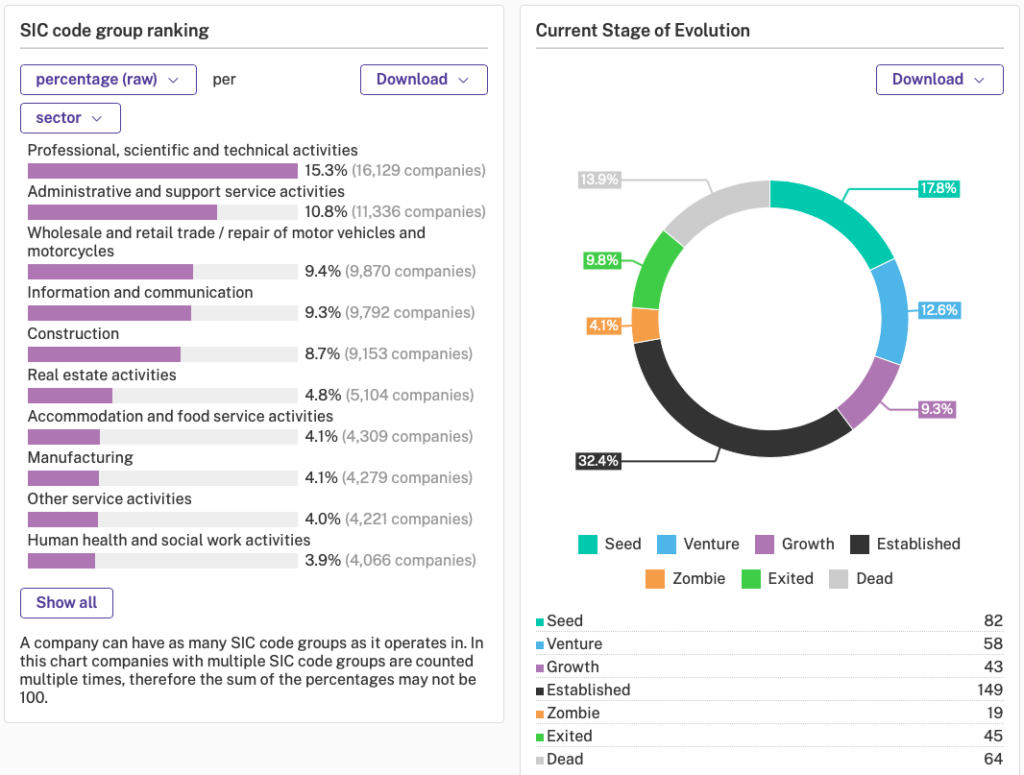
These charts show a breakdown of businesses in the area by SIC codes and by stages of evolution respectively. You can also see information, such as:
- The number of companies that have been found and that have ceased business
- A breakdown of the industries in which they operate
- An overview of the number of employees in each company, presented by gender
- News stories about specific businesses
- Top-level employment rates, job statistics, and which skills are most in demand
- Other overall trends
Then you can refine those results even further, to effortlessly find trends on businesses in a particular sector or by a particular stage of evolution. For example, a local authority might want to filter businesses in Swindon according to whether they export abroad.
The below graph shows the number of exporting businesses in Swindon that have been founded—as well as those that have ceased trading:
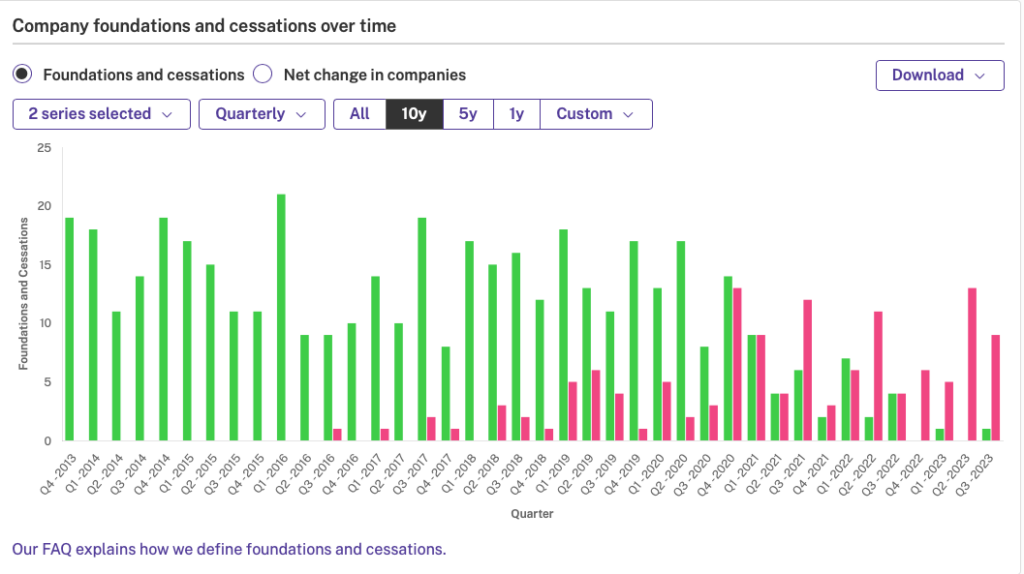
There are many other ways that universities, local authorities, and investors can use this data. For example, the Coventry and Warwickshire Growth Hub uses Beauhurst to find information on local businesses and produce reports for the government.
“By using the Coventry and Warwickshire Growth Hub as a location criteria on Beauhurst [I can] focus my search on businesses operating within a certain postcode,” says Jon Bass, Finance Specialist at the Growth Hub. “Without Beauhurst, I’d be looking for needles in haystacks… I’d be searching for weeks and creating spreadsheets like they’re going out of fashion. And that’s not a good use of my time. But with Beauhurst, it’s easy.”
“All in all, Beauhurst must save me at least five hours a week.”
5. Receive real-time updates on relevant companies, people, or regions
A single search on a company database might give you a snapshot of a business, person, or region at a particular moment in time. But a single snapshot is never enough if you need to keep up-to-date on local investment opportunities, competitors, influencers, or trends.
Beauhurst solves this by keeping you in the loop about the business activity you’re most interested in. With our platforms, you can save any search into the “My Collections” tab and be notified whenever any changes are made to these datasets. This way, if a company hires a new executive or gets funding, you’ll be notified immediately. Or, if a new business enters your local region, or spins out of a competing university—you’ll be the first to know.
Whenever you make a search, simply click “Add to collection”. Then you can select how you receive updates and the sorts of information you’re interested in.
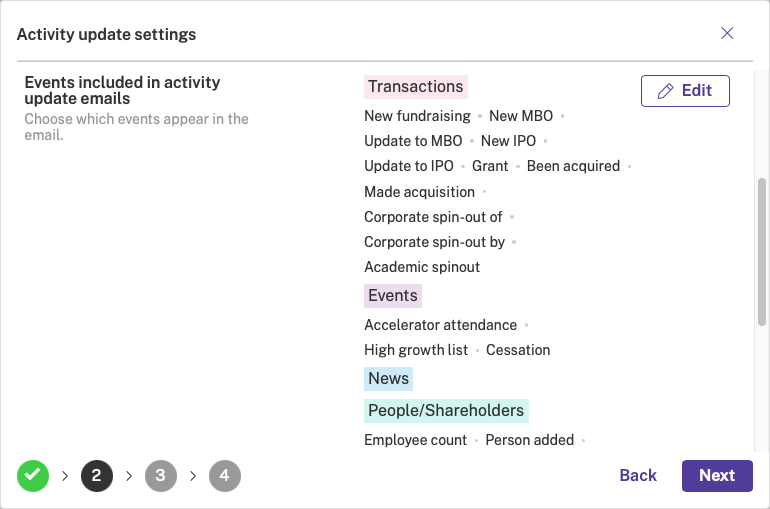
For example, you can receive emails with key business updates daily or weekly. Or view your Collections to see updated information on your saved businesses or regions.
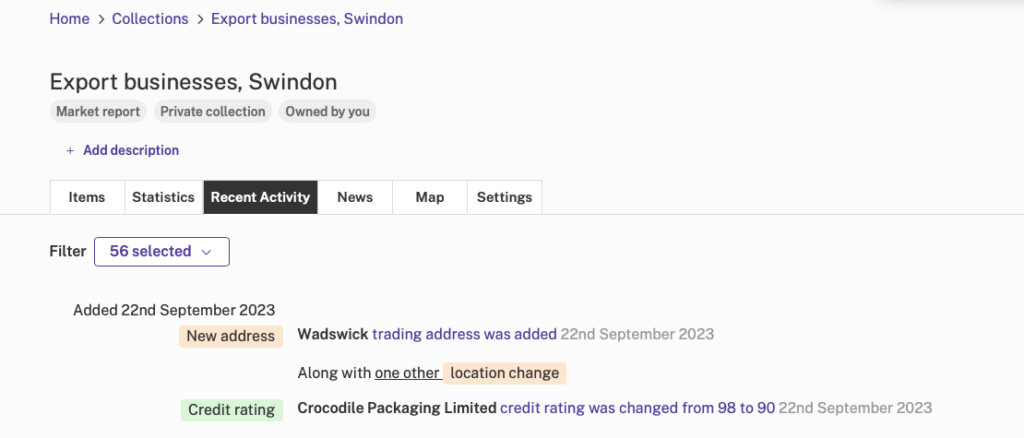
The Dorset Local Enterprise Partnership is a great example of how local governments or universities can use Collections. The Dorset LEP uses BeauhurstImpact to track scaleup companies and other high-growth businesses in the local area, in order to create weekly reports for BEIS and perform outreach campaigns.
“We report to the Government on a weekly basis,” Finn Morgan, Business Engagement and Dorset Gateway Manager, explains. “I construct these reports using Beauhurst’s Collections feature—I have weekly alerts set up for local businesses, which notify me of any updates, such as a change in headcount or registered address, or a new foreign investment.”
“When we’re doing cold outreach to businesses […] we can say something like ‘I see you’ve got a new CFO’ or ‘congratulations on securing that Innovate UK grant’, and this really opens up the conversation for us—it shows that we’ve done our due diligence and know what we’re talking about.”
Beauhurst: The ultimate UK private company information database
No other private company information database contains the depth and breadth of Beauhurst’s data. With one of our four platforms for private and public sector organisations, you can get business information that’s accurate, up-to-date, standardised, and searchable.
Plus, with Beauhurst, you get access to:
- Dedicated account management. When you work with Beauhurst, you’ll have an account manager to help you and solve any problems at every step of the way.
- The Beauhurst API, that directs live information straight from our database into your CRM or other systems. It’s like having a really efficient assistant.
- CSV files and PDFs for other ways to visualise key data.
Book a demo now to speak to an expert and find out how Beauhurst can work for you.
Grow your business.
Get access to unrivalled data on all the companies you need to know about, so you can approach the right leads, at the right time.
Book a demo today to see all of the key features of our platforms, as well as the depth and breadth of data available.
An associate will work with you to build a sophisticated search, returning a dynamic list of organisations that match your ideal customer profile.
Beauhurst Privacy Policy